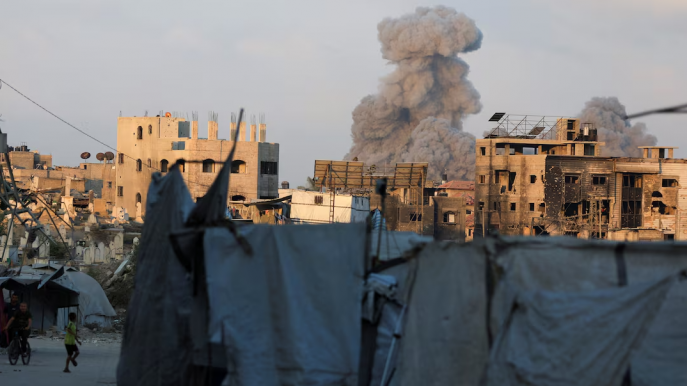Israeli forces have initiated the first stages of a planned ground offensive in Gaza City, prompting thousands of Palestinians to flee neighborhoods like Zeitoun and Sabra. The operation, which follows intense bombing and artillery fire, has raised alarms among international leaders and humanitarian organizations, who warn of catastrophic consequences for Gaza’s 2.1 million residents and the remaining hostages held by Hamas.
Israel’s Military Strategy
On August 21, 2025, the Israel Defense Forces (IDF) announced that troops had established a foothold on the outskirts of Gaza City, a densely populated area home to over a million Palestinians. Brigadier General Effie Defrin, an IDF spokesperson, stated that the operation aims to dismantle Hamas’s infrastructure, describing the group as “battered and bruised” after nearly two years of conflict. The IDF has already deployed two brigades in Zeitoun, where they uncovered an underground tunnel containing weapons, and a third in Jabalia to prepare for the offensive.
Israel’s government, led by Prime Minister Benjamin Netanyahu, is accelerating plans to capture Gaza City, which it views as a key Hamas stronghold. To support the operation, 60,000 reservists have been called up for early September. Netanyahu described the offensive as a move to seize “the last terror strongholds” in Gaza, despite international calls for restraint. The Israeli security cabinet is set to finalize the plan later this week.
Palestinian Displacement and Humanitarian Crisis
As Israeli troops advance, hundreds of thousands of Gaza City residents are expected to receive evacuation orders to move south. Gaza’s Hamas-run Civil Defence agency reported that recent Israeli strikes killed 25 people across the territory, including a family of five in the Shati refugee camp. Mahmoud Bassal, a spokesperson for the agency, described the situation in Zeitoun and Sabra as “very dangerous and unbearable.”
The International Committee of the Red Cross (ICRC) warned that further displacement and intensified fighting could worsen an already dire humanitarian situation. “The people in Gaza are utterly exhausted,” the ICRC stated, emphasizing the need for food, medical supplies, clean water, and safe shelter. The United Nations Secretary-General António Guterres also renewed calls for an immediate ceasefire to prevent “death and destruction” and urged the unconditional release of hostages.
Ceasefire Talks and International Criticism
The conflict, which began with a Hamas-led attack on southern Israel on October 7, 2023, has resulted in significant loss of life. According to Israeli figures, the attack killed 1,200 people and led to 251 hostages being taken, with 50 still in captivity, 20 of whom are believed to be alive. Gaza’s health ministry reports that over 62,000 Palestinians have been killed since the war began, with most casualties being women and children.
Mediators from Qatar and Egypt have proposed a 60-day ceasefire that would include the release of some hostages and Palestinian prisoners. Hamas accepted the proposal, but Israel has not formally responded, insisting on a comprehensive deal that frees all hostages. Hamas accused Netanyahu of obstructing negotiations, while Israel’s allies, including French President Emmanuel Macron, warned that the offensive could lead to “disaster for both peoples” and risk a “cycle of permanent war.”
Clashes and Broader Implications
On Wednesday, Israeli troops clashed with Hamas fighters near Khan Younis, south of Gaza City. Hamas’s Al-Qassam Brigades claimed responsibility for a raid that included a suicide attack, resulting in casualties among Israeli soldiers. The ongoing violence has deepened fears of further devastation in Gaza, where much of the infrastructure, including homes, schools, and mosques, has already been destroyed.
Israel’s plan to take over Gaza City has drawn condemnation from allies and raised concerns about the fate of both Palestinian civilians and the remaining hostages. The Latin Patriarchate of Jerusalem reported that neighborhoods near Gaza City’s Catholic Church have received evacuation notices, signaling the operation’s imminent escalation.
Looking Ahead
As Israel presses forward with its offensive, the international community continues to push for a ceasefire to alleviate Gaza’s humanitarian crisis and secure the release of hostages. However, political pressures within Israel, including from far-right coalition members like Finance Minister Bezalel Smotrich, who recently approved a controversial West Bank settlement project, may complicate efforts to end the conflict. With Gaza City on the brink of a major military operation, the region faces an uncertain and perilous future.








